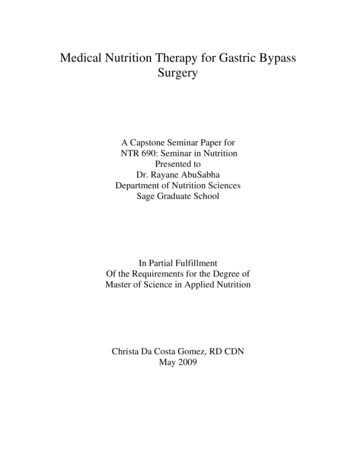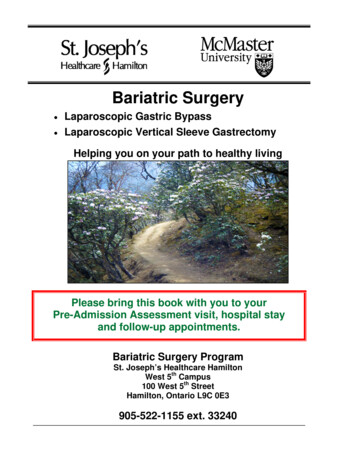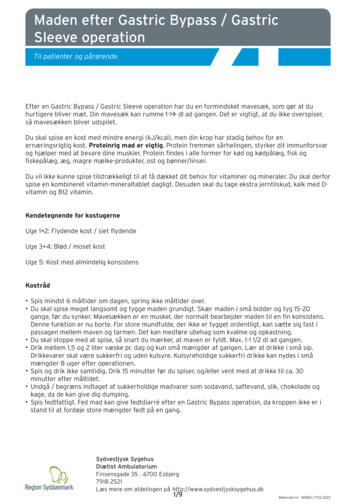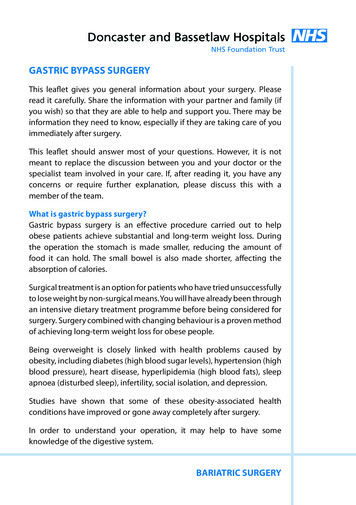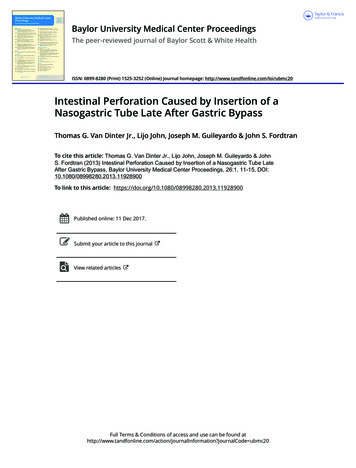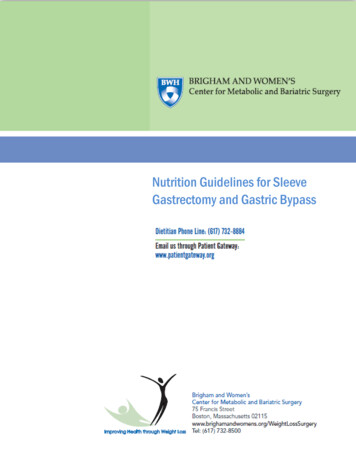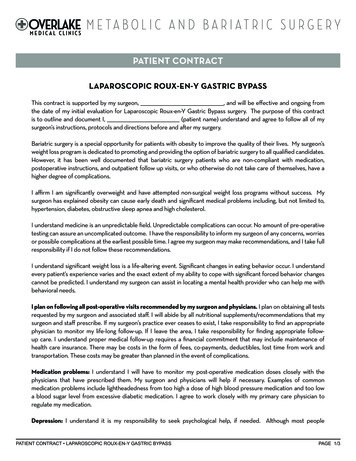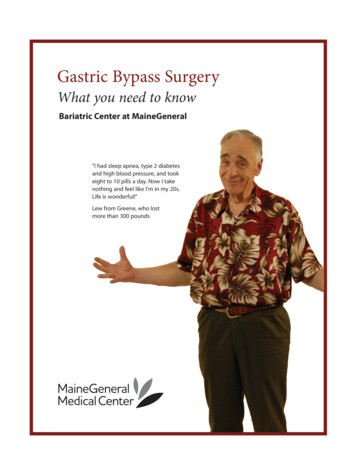
Transcription
Gastric Bypass SurgeryWhat you need to knowBariatric Center at MaineGeneral"I had sleep apnea, type 2 diabetesand high blood pressure, and tookeight to 10 pills a day. Now I takenothing and feel like I'm in my 20s.Life is wonderful!"Lew from Greene, who lostmore than 300 pounds
Gastric Bypass Surgery: What You Need to KnowWelcome!Welcome to MaineGeneral's Bariatric Center. You have taken an important first step toward a healthier future.Our goal is to help each patient lose weight, live longer and improve his or her quality of life.Our team partners with patients before, during and after surgery to help them gain better control of their foodintake for the rest of their lives. We are committed to following our patients' progress long-term to help themreach and maintain healthy, realistic weight loss.lGeneral surgeons specially trained in bariatric procedures;lBariatric nursing staff;lBariatric dietitians;lBariatric social worker;lPersonal trainer.No weight-loss method, including surgery, is guaranteed to produce and maintain results. To be successful,patients must fully commit to making dietary and lifestyle changes and following the Bariatric Center'srecommendations.Morbid obesity: a serious health riskObesity is a disease where excess body fat may lead to increased health problems and/orreduced life expectancy. These serious, potentially life-threatening health problemsinclude:lHypertension (high blood pressure)lDiabeteslGastro-esophageal reflux (GERD, heartburn)lBreathing problems while sleeping (obstructive sleepapnea)lHyperlipidemia (high cholesterol)lCholelithiasis (gallstones, gallbladderdisease)lDegenerative arthritislIncreased risk for coronary disease,unexplained heart attacklInfertilitylHigher prevalence of colon, prostate, endometrial, and, possibly, breastcancer.According to the American Obesity Association, obese persons have a50-100 percent increased risk of death as compared to people of normal weight.This substantial increase in health risks has made obesity the second leading causeof preventable death in the United States. These are the people we hope to help atMaineGeneral's Bariatric Center.-1-What You Need to KnowThe Bariatric Center has a dedicated well-trained team to provide our patients with the best care possible.Our team consists of:
Why you should consider surgeryMost severely obese people have tried many times to lose weight. Many lose weight and then gain it all back.Some gain even more. Few can achieve long-term success in maintaining weight loss because research shows thatsevere obesity is a chronic disease. For 95 percent of the clinically obese, non-surgical treatment has not worked inachieving sustained weight control. Only weight-loss surgery, combined with lifestyle changes, helps most severelyobese people lose weight and keep it off.Why choose gastric bypass?Research has proven that gastric bypass surgery is the most effective method for controlling severe obesity inpatients with a BMI (body mass index) equal to or greater than 40. Statistics show gastric bypass has the best overalloutcome for weight loss and long-term weight control. In addition, diseases related to severe obesity are eliminatedor greatly reduced as a result of gastric bypass surgery.Are you a good candidate for surgery?The surgeons at the Bariatric Center use the following criteria to decide which patients are right forgastric bypass surgery. These criteria were developed by the American Society for Bariatric Surgery (ASBS).You must:lHave a BMI of 40 or greater (100 pounds or more above your ideal body weight);lHave reduced quality of life due to morbid (severe) obesity;lHave a medical condition that would be improved by losing weight, such as hypertension, diabetes,cardiac concerns, high cholesterol, asthma, gastro-esophageal reflux disease (GERD), sleep apnea,breathing problems or arthritis;lNot have a psychological or medical condition where the risk of surgery outweigh the benefits;lHave tried unsuccessfully to lose weight on your own, through traditional programs(like Weight Watchers) or through doctor-supervised weight loss programs;lBe able and willing to participate in treatment and be committed to long-term follow-up;lBe motivated to change your lifestyle, for the rest of your life; andlBe 18 years of age or older.The gastric bypass operation: What it involvesThe surgeons at MaineGeneral's Bariatric Center perform the Roux-en-Y gastric bypass. There are two parts tothis operation. First, the surgeon makes a very small stomach pouch (less than one ounce) by dividing the stomach.This restricts the amount of food you can eat at any one time. Second, by bypassing most of the stomach and thefirst part of the small intestine, your body cannot absorb as many nutrients (calories). The combined result of thesetwo components is you take in fewer calories than your body needs. This leads to effective weight loss.The operation is done with laparoscopic instruments through several small incisions. This means less pain,quicker recovery, fewer wound complications, earlier discharge from the hospital and less scarring.-2-
How will surgery help me to lose weight?With the Roux-en-Y gastric bypass, you will only be able to eat very small meals. You will feel full after just a fewbites of food. Because part of your digestive system is not used, your body cannot absorb all the calories in thefood. If your body needs more energy than your food provides, it will take it from excess fat and you will loseweight.This operation is just one of many changes you will need to make if you want to lose weight and keep it off. Youalso need to exercise regularly. If you do not, you will have less than satisfactory weight loss results.Possible complicationslLeaking from one of the connections created by surgery. Your surgical team checks these connectionsseveral times during and after surgery to assess for leaks. Leaks almost always require a second operationand the placement of temporary drainage tubes, and possibly a feeding tube.lExcessive bleeding from one of your incisions or another place cut during the surgery. This may require asecond operation and/or a blood transfusion.lBlood clot that forms in your legs and can travel to your lungs. To reduce this possibility, the nurses willhelp you out of bed the day after surgery and ask you to walk in the halls. They will also give youmedication while you are in the hospital to help prevent blood clots.lInfection that could require medication, hospitalization or a second operation.lStrictures or narrowing of the connections made during surgery. Strictures can usually be treated byexpanding the connection, but sometimes require another operation.lVitamin/nutrient deficiencies because your body is not absorbing all the nutrients in your food.You must take the recommended supplements every day.lFailure to lose weight if you do not follow our recommendations before and after surgery.Other complications can occur with gastric bypass surgery. It is critical that you follow up with your surgeon andprimary care physician for the rest of your life so problems can be treated early and resolved quickly.One important note: Patients can never again eat sweets or any meal containing processed sugars, even if it doesn'ttaste sweet. Processed sugars often cause dumping syndrome soon after being eaten. This unpleasant condition caninclude any of the following: cramping and explosive diarrhea, overwhelming flu-like fatigue, nausea,lightheadedness, sweating and heart palpitations.Gastric bypass is permanentIt is possible to reverse this operation, but it is a difficult and dangerous procedure. If you feel you could not livewith this permanent surgery and the lifestyle changes required, do not have this operation.Anticipated resultsPatients who make the required lifestyle changes can expect major weight loss and improved health.The average patient will lose 60 to 80 percent of his or her excess body weight in the first 18 to 24 months.Your success depends on life-long dietary changes and increased exercise. If you keep overeating, the pouchcan stretch over time. Eating fatty and fried foods and snacking through the day can greatly increase weightgain despite the small stomach pouch.-3-What You Need to KnowAll surgeries carry the possibility of complications and the Roux-en-Y gastric bypass is no exception.Your surgeon will discuss the possible complications with you during your first and final visits before surgery.They are outlined below. As always, feel free to call the Bariatric Center if you have any questions.
The choice is yoursChoosing bariatric surgery requires a lot of careful thought. This is a major surgery that, by itself, will not guaranteelong-term success. This surgery is a tool that allows you to feel full and help you choose a healthy lifestyle. You candefeat the surgery by ignoring program guidelines/suggestions, drinking high-calorie liquids, continual snacking andinactive living.The choice is yours.Follow-up & supportBecause gastric bypass requires you to make life-long changes in behavior and lifestyle, MaineGeneral's BariatricCenter offers a life-long follow-up program and support group system. The groups give patients and their families anopportunity to discuss concerns about the gastric bypass surgery, how it has affected their lives and any problemsthey may be having. At the support group meetings, we talk about eating habits, nutritional supplements, exerciseand coping skills to help patients make lasting adjustments to the surgery. Patients and family members give andreceive support from others who have experienced the surgery. They find this support and guidance essential toensuring long-term weight maintenance.Say "Yes" to exerciseExercise is a critical part of any successful weight loss program. You do not need any special or expensive equipmentsuch as treadmills or stationary bikes to exercise. All you need is YOU and a pair of well-fitting sneakers.Our certified personal trainer will help you develop an exercise plan that works for you, keeping any of yourlimitations in mind. You will receive exercise bands and tubes with instructions in their use. Our trainer also offersweekly exercise classes at a discounted rate for patients who want to attend. He goes to the monthly support groupsto discuss any ongoing concerns or questions you may have about your exercise program.Do not make excuses.Patients who do not exercise lose less weight than those who do.Insurance coverage & financial responsibilitiesMost insurance companies cover weight loss surgery. But because gastric bypass is elective, please understand thatno insurance company will pay 100 percent of the surgery costs. We urge you to call the customer service numberlisted on your insurance card to see if your insurance company covers gastric bypass and talk about your financialresponsibility.If you are a good candidate for this surgery, our staff will submit your information and supporting documentation toyour insurance company for pre-approval. Some insurance companies have a very rapid pre-approval process, whileothers may take 4-6 weeks. Please be patient during this process.If your insurance company denies your request for surgery, we will appeal this denial. We will also helpyou resolve any problems you may have with your insurance coverage before and after your surgery.-4-
The Gastric Bypass Process, From Start to FinishInformational sessionFirst consult with the bariatric surgeonYou will meet with the surgeon to talk about whether gastric bypass surgery is right for you. Please bring yourcompleted medical history form to this appointment. Your surgeon will review your complete health history, assessand discuss your current health issues with you, explain the gastric bypass surgery and possible complications andanswer any questions you may have. The doctor may order several tests during your first visit. These tests mayinclude blood work, diabetes screening, an electrocardiogram to evaluate the heart, a nutrition evaluation and apsychiatric evaluation. If you have symptoms of sleep apnea, you may be sent for a sleep study.Dietary consultBecause you will eat in completely new ways after your surgery, you will meet with a registered dietitian at leastthree times before your gastric bypass. The dietitian will evaluate your diet and weight loss history and your pasteating habits so you understand the role food has played in your life. She will instruct you on the bariatric diet andnew eating habits that will help make this surgery a success. This complete nutrition instruction will also includetips on improving nutrition, dining out and dealing with stress and emotional triggers.Psychological consultAre you ready both physically and emotionally for gastric bypass surgery? Can you adjust to the major lifestylechanges associated with weight loss surgery? Your visit with the psychologist/psychiatrist will determine if you arementally prepared for gastric bypass surgery, in light of your current and past experiences and how weight hasaffected your choices in life. You may be asked to see a counselor or take medication before you can be approvedfor surgery.Final visit before surgeryAt this visit, the surgeon will answer any final questions you may have. He will also discuss details about yoursurgery, recovery and follow-up, as well as review the possible complications of the operation.Pre-surgery testingBefore your surgery, we will schedule you for several X-rays, blood work and pre-admission assessment at thehospital.-5-The Gastic Bypass Process, From Start to FinishBefore you can set up a consult with the surgeon, you must attend the bariatric informational session.These two-hour evening sessions are held monthly in Augusta or Waterville. After this meeting, you mustask your primary care provider to send a referral letter to the Bariatric Center. We will then send you aninformation packet which you must complete and bring with you to your first visit with the surgeon.
Before surgery dietTwo weeks before surgery:l No solid foodlProtein shakes, instead of meals, three times a daylClear liquids24 hours before surgery:l Stop protein shakeslClear liquids onlyAfter midnight the night before surgery:l Nothing to eat or drink until after surgerylNo water or other liquids; no solid foodMedication changes after surgeryBefore your gastric bypass surgery, discuss your medications with your pharmacist or regular doctor. Because largepills may get stuck in the stomach pouch, all medications must be in a crushable, chewable or liquid form. Timereleased medications may not work if crushed, so ask your doctor for a new medication. This is important! If you donot change your medication before surgery, your surgery may need to be re-scheduled. Your surgeon will notmanage medications that do not directly relate to the gastric bypass surgery. Do not stop taking any medicationsbefore checking with your regular doctor.Your hospital stayThe average hospital stay after surgery is three days. After your surgery, your nurses will help you get out of bed andsit in a chair. This helps prevent blood clots from staying in bed for too long.To protect the newly made connections while they heal, you will not be able to eat or drink that first day after youroperation, but you can have sips of water. Your nurses will help you to walk several times, even if you are in pain.On the second day after your surgery, you will start on Phase I of the gastric bypass diet. This consists of clearliquids, broth, water and JELL-O gelatin. You will also walk several times a day. Both the Phase I diet and walkingwill continue on day three. Discharge from the hospital usually occurs on day three, depending on how you aredoing. Your surgeon will make that decision after visiting you in the hospital.Follow-upTo ensure your good health and reduce the risk of problems, the Bariatric Center staff will monitor you closely afteryour surgery. It is also important to maintain contact with your regular doctor, i.e., let him/her know how thesurgery went and get your annual physical.Your surgeon will meet with you two weeks after your surgery, or sooner if needed. He will see you again at threemonths, six months, nine months and then at one year after your surgery.After one year, you and your surgeon will decide how often you will be seen in the future; this is usually once peryear. At these appointments, the doctor will discuss your progress and answer any questions or concerns you mayhave. We also monitor lab work to ensure your continued good health.-6-
When to call the Bariatric CenterWe welcome calls and questions from patients and family members any time. If you have worsening pain, fever,chills, nausea or vomiting in the first two weeks after your surgery, call our office immediately or go to the nearestemergency room. You also need to call us if your incisions become red, swollen or are more painful.lExercise for 30 to 60 minutes most days of the week.lTake vitamin and mineral supplements every day.lDrink 64 oz. of sugar-free and noncarbonated liquid every day.lEat protein-rich foods first and at every meal.lEat slowly, chew your food well and avoid distractions while eating.lAvoid all sugar-sweetened foods and drinks.lAvoid high-calorie liquids (shakes, ice cream, alcohol, fruit juice).lAttend support meetings when you can.lDo not smoke.lDo not take large pills or capsules.lContact our office right away with any emergency or concern.lPlease keep all follow-up appointments."At my heaviest, I couldn't evenwalk with my kids at DisneyWorld. Now I run 5K races.Words cannot describe how itfeels going across that finishline. I've come so far."Diedra from Farmingdale,who lost 93 pounds-7-The Gastic Bypass Process, From Start to FinishTips for a healthy lifestyle
-8-
After Gastric BypassYour First MonthIt takes about three months for your pouch to completely heal and strengthen. During the first month aftersurgery, you should eat only foods with the texture of applesauce. You will need to use a blender to prepare yourmeals. Blend your foods until smooth. Add liquids such as broth or milk, if necessary. Remove any lumps. Somefoods blend more easily than others, so you might want to try blending some of your favorite foods before youhave surgery.You cannot eat and drink at the same meal after having bariatric surgery. You must stop drinking 30 minutesbefore you eat solid foods. You must wait one hour after eating a solid meal before you can drink liquids. If you eatand drink at the same time, you may overfill your pouch or flush foods through too quickly.Consuming enough fluid is important. You need to drink 6 to 8 cups of liquid every day after surgery.You may need more in hot weather or during exercise. Because you must drink slowly and not eat and drink at thesame time, it is hard to get in the full amount of liquid. You must sip throughout the day. Bring liquids with youwherever you go so you do not forget to drink. If you aren't going to the bathroom as often as usual or your urinetakes on a dark yellow color, you're probably not drinking enough and are becoming dehydrated. Dehydration canalso cause nausea, fatigue, lightheadedness and constipation.To avoid taking in excess air, you should avoid carbonated beverages. You should not use straws orsports-top water bottles for the same reason. Avoid chewing gum as well.Avoid alcohol and caffeine, which can irritate your stomach and can be high in calories.-9-After Gastic BypassYour normal stomach can hold about 5 cups of food. After the surgery, your new stomach will hold no more than1/4-cup, or 2 oz., of food. You must eat very slowly so you do not overfill your pouch and cause pain ordiscomfort. A tiny meal may take you 30 minutes to eat. Eating for longer than 30 minutes may allow you to eattoo much. You should eat three small meals a day unless your doctor tells you otherwise. You should stop eatingwhen you feel full.
Food Guidelines with Gastric Bypass SurgeryBefore & after surgery:lEat three healthy meals a day.lDon't skip meals.lEat protein first at meals. Avoid sandwiches and mixed dishes.lDon't snack between meals, unless you are truly hungry.lChew every bite to baby-food consistency, or 25-30 times per bite.lEat slowly, 20-30 minutes per meal.lAvoid distractions with meals. Sit at the table and do not watch TV, read, etc.lDo not chew gum or drink through a straw. Avoid sports-top water bottles.lDon't drink anything with meals, 30 minutes before and 60 minutes after meals.lAim for 48 to 64 oz. of fluids daily.lDon't drink carbonated beverages.lAttend support group meetings.After surgery, you also need to:lStop eating when you feel full. Your new stomach can only hold a few tablespoons of food. Eventually it willhold 1/2 to 1 cup. Eating too much may bring about nausea and vomiting.lAvoid extreme temperature changes in liquids for the first three months.lIntroduce one food at a time to make sure you can tolerate it.lCheck how you tolerate dairy products; drink LACTAID instead of regular milk, if needed.lSet up a schedule for vitamin supplements and medications.lCommit to regular lab testing.lExercise regularly.- 10 -
Diet SequenceYou will achieve the best results if you follow these guidelines.After-Surgery Diet (in hospital)Day 0 - The day of surgery:l Nothing by mouthlSip slowlylDo not use a straw to drinklNo ice chipslAvoid extreme temperature changes with liquid for the first three monthslIf you are tolerating water well, with no nausea or vomiting, you will advance to the next stageof the diet.Phase 1: Gastric Bypass Diet - Day two through discharge from hospitallClear liquids, with no sugar added. See ideas below.lSip slowly. Remember to stop drinking 30 minutes before meals and for 60 minutes after meals.Clear Liquid Diet Menu OptionslSugar-free JELL-OlChicken brothlBeef brothlSugar-free Popsicles lDecaffeinated tealFlavored water (non-carbonated)Sample MenuBreakfastl ½ cup decaffeinated teal½ cup low-sodium brothLunchl½ cup flavored waterl½ cup sugar-free JELL-ODinnerl½ cup low-sodium brothl½ cup sugar-free JELL-O- 11 -After Gastic BypassDay 1 - The day after surgery:l 1 oz. (30 cc) of water every hour
Phase 2: Gastric Bypass DietStart at home when you leave the hospital and continue for two weeks.lStart with 4-oz. protein shakes three times a day as tolerated. Work up to 8-oz. protein shakesthree times a day.lSip slowly; it may take up to 30 minutes to eat.lStop when you feel full.lDo not skip a meal.lDrink clear liquids in between shakes. Remember to stop drinking 30 minutes before meals and for60 minutes after meals.** Typical intake after the first day home from the hospital: A total of 12 oz. protein shakes andeight to 12 oz. clear liquid per day.** Typical intake after two weeks: A total of 24 oz. protein shakes daily and 24-32 oz. clear liquid per day.Two weeks after surgery, after your visit with the surgeon, begin taking these vitamin/mineral supplements:lComplete multivitaminlCalcium citrate 1500 mg/daylVitamin B complexlVitamin B-12. If you choose to do injections, please bring your medication and syringes to yourafter-surgery visit with the surgeon. The nurse will teach you how to give yourself the shot.If you choose pills, you may begin them with the other supplements.lIronSample Menu:Breakfastl 4 to 8 oz. protein shakeMidmorningl ½ cup flavored waterLunchl4 to 8 oz. protein shakeMidafternoonl ½ cup brothDinnerl4 to 8 oz. protein shakeEveningl ½ cup sugar-free JELL-O* Use a protein supplement that contains 20 grams of protein per serving.* Drink more sugar-free liquids throughout the day.- 12 -
Phase 3: Gastric Bypass DietFrom two weeks to eight weeks after surgery (a total of six weeks)lEat only soft or pureed protein. See examples below.lEat protein first.lChew food to an applesauce-like texture for the best tolerance.lDrink protein shakes between meals to reach established protein goal.lEach meal should take 20 to 30 minutes to eat.lDo not drink anything with meals, 30 minutes before meals and for 60 minutes after meals.lEgg Beaters lEggs - one yolk or less per day.lCheese (low-fat) - 2 grams fat per servinglVeggie cheeselCottage cheese - 1 percentlYogurt - light, fat-freelSkim milklTuna fish - packed in waterlCanned chickenlFresh white fish - cod, sole, flounder, scallops, imitation crabmeat, shrimplLegumes - kidney beans, black beans, garbanzos (chick peas)lTurkey breast or ham - Healthy Choice or low-fat varietieslTofu, BOCA burger, soy productsAny other protein food must be lean and ground in blender to baby-food texture. This avoids a blockage that canproduce terrible abdominal pain, vomiting or nausea. Avoid tough, dry cuts of meat for the first six months.You are slowly adding solid foods to your diet to make sure you tolerate them well. The pouch is smallso you must eat your protein first. This helps promote wound healing and prevent muscle loss.The following foods are not allowed yet:lBread;lCereal;lRice;lNoodles/pasta;lFruits; andlVegetables.- 13 -After Gastic BypassSuggestions for high-protein foods:
Sample Menu:Breakfastl 1 soft boiled egg or ½ cup yogurtSnacklWater or Crystal LightLunchl½ cup cottage cheese or 1 to 2 oz. fishSnackl4 to 8 oz. protein shakeDinnerl1 to 2 oz. Healthy Choice turkey slicesl1 oz. low-fat cheeseSnackl4 to 8 oz. protein shakePhase 4: Gastric Bypass DietStarts eight weeks after surgery and continues for 12 months or until you achieve your weight-loss goal.lMeat does not need to be pureed. Avoid dry tough cuts of meat for six months.lCut meat into small pieces and chew well.lAdd cooked vegetables to your diet.lIntroduce raw veggies after you've tried cooked veggies.lAvoid corn, fresh asparagus and broccoli stalks.lEat protein first.lTake 20 - 30 minutes for each meal.lStop as soon as you feel full.lNo liquids with meals. Remember to stop drinking 30 minutes before meals and for 60 minutes after meals.lIntroduce one new food at a time to test for tolerance.lNo distractions at mealtimes (no TV, reading, telephone). Focus your attention on your meal.lMake healthy food choices.lYou can stop having protein shakes now unless you need help meeting your protein requirement.( grams per day as directed by your dietitian.)- 14 -
Sample Menu:Breakfastl 1 egg with 1 oz. cheese or 1/2 cup cottage cheeseSnacklWater or Crystal Light Lunch:l2 oz. deli meatl¼ to ½ cup cooked carrots or ½ to 1 cup green saladSnackl8 oz. milk or 4 to 8 oz. protein drink*Dinnerl2 to 3 oz. chicken or fishl¼ to ½ cup cooked broccoli crownslWater, Crystal Light * You can have protein shakes if you cannot meet your protein needs with solid foods.- 15 -After Gastic BypassSnack
- 16 -
Maintaining Your New LifestyleMaintenance Gastric Bypass DietBegins 1 to 1½ years after surgerySample menu:l 2 to 3 oz. meat (14 grams protein)l½ cup vegetable (2 grams protein)l*1/2 cup starch - rice, pasta, bread, cereal or potato (3 grams protein)lFruit (0 grams protein)Meal ideasBreakfast:l Yogurt parfait (made with yogurt, granola and 1 scoop protein powder)lScrambled eggs (limit 3-4 eggs per week)lEgg Beaters (every day, if you wish)lOatmeal (make with skim milk; add protein powder)lCottage cheese (with fruit, if you prefer)Lunch:lLow-calorie microwave dinners (250-350 calories)lSalmon burgerslGarden burgerslBlack bean burgerslFish pattieslTuna, ham or chicken salad (made with low-fat dressing)lTaco salad (omit chips and use low-fat dressing)lLow-fat string cheese and whole-grain crackerslChililSteamed vegetablesDinner:l Low-calorie microwave dinners (250-350 calories)lGrilled chicken stripslBaked chicken breastlBaked lean hamlStewed chickenlBaked tilapialGrilled tuna steakslGrilled salmon- 17 -Maintaining Your New Lifestyle*Only add starch when you are halfway to your weight-loss goal
upelCanned pineapplelPeeled appleslUnsweetened applesaucelFruit cocktaillSmall grapeslPeeled peacheslFresh or canned pearslPapayalMangolHoneydew melonlCauliflowerAll canned fruit must be canned in natural juiceVegetables:l ZucchinilOnionslPeeled cucumberslAcorn squashlBaked sweet potatolGreen beanslStewed tomatoeslSalad greenslMushroomslWell-cooked broccoli crownslBeetslSpinachlCarrotslSkim milkMilk & dairy:l Light yogurt (sugar-free, fat-free or low-fat)lFat-free or reduced-fat sliced cheeseslFeta cheese - lightlParmesan cheese made with skim milklMozzarella cheese made with skim milklScallopslClamslChicken breast strips (not breaded)lCooked shrimplHalibutlHaddocklCodlTilapialLean ground beef or turkey (90-98 percent lean)lCrabmeatlPink salmonlTurkey breastlCanadian baconlLean hamlLean pork chopslTuna steakslAvocadoMeats:Nuts & oils:l Extra virgin olive oillOliveslPeanut butter (small amounts)lFat-free or light mayonnaise or Miracle Whip lMargarine (small amounts)- 18 -
Starches:l Whole-wheat or whole-grain breadslWhole-grain crackerslBrown ricelWhole-grain cerealslWhole-wheat pastaBeverages:l Decaf coffee or tealWaterlSugar-free flavored beverageslSkim or 1 percent milklSoy milklLactose-free milklFlavored waterlSugar-free or fat-free hot cocoalFat-free brothRemember:lWeight-loss surgery is not a cure for obesity. It helps control obesity.lUse your pouch as a tool.lTake responsibility for your health and your life!lMake protein your first priority to protect your muscle mass. Goal is grams per day.ProteinProtein is the major building block of the body. It is vital for building muscle and repairing cells. Protein helpsmaintain our body's proper fluid balance and provides energy to help our bodies function properly. Protein also isessential to enzyme and hormone production. Major sources of protein include meat, fish, poultry, eggs, milk anddairy products, dried beans and peas and peanut butter.You need to eat the right amount of protein, even though you are eating fewer calories than your
Because gastric bypass requires you to make life-long changes in behavior and lifestyle, MaineGeneral's Bariatric Center offers a life-long follow-up program and support group system. The groups give patients and their families an . Some insurance companies have a very rapid pre-approval process, while others may take 4-6 weeks. Please be .

